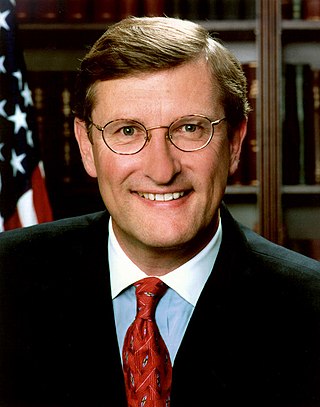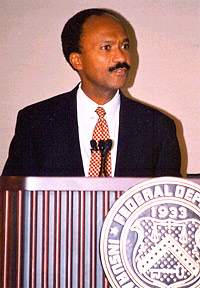The Federal National Mortgage Association (FNMA), commonly known as Fannie Mae, is a United States government-sponsored enterprise (GSE) and, since 1968, a publicly traded company. Founded in 1938 during the Great Depression as part of the New Deal, the corporation's purpose is to expand the secondary mortgage market by securitizing mortgage loans in the form of mortgage-backed securities (MBS), allowing lenders to reinvest their assets into more lending and in effect increasing the number of lenders in the mortgage market by reducing the reliance on locally based savings and loan associations. Its brother organization is the Federal Home Loan Mortgage Corporation (FHLMC), better known as Freddie Mac. In 2023, Fannie Mae was ranked number 28 on the Fortune 500 rankings of the largest United States corporations by total revenue.

Christopher John Dodd is an American lobbyist, lawyer, and Democratic Party politician who served as a United States senator from Connecticut from 1981 to 2011. Dodd is the longest-serving senator in Connecticut's history. He served in the United States House of Representatives from 1975 to 1981.

Gaylord Kent Conrad is a former American politician who was a United States Senator from North Dakota. He is a member of the North Dakota Democratic-NPL Party, the North Dakota affiliate of the Democratic Party. First elected to the Senate in 1986, he served as chairman or Ranking Member of the Senate Budget Committee for 12 years.

Elton William Gallegly is a former U.S. Representative from California. A Republican, he last represented California's 24th congressional district. He previously represented the 23rd and 21st Districts, and served from 1987 to 2013. He did not seek re-election in 2012.

Howard Philip "Buck" McKeon is an American politician who served as a U.S. representative from California's 25th congressional district from 1993 to 2015. He is a member of the Republican Party. He is a former chairman of the House Armed Services Committee and the House Education Committee.

Robert Ruhl "Rob" Simmons is an American politician and retired U.S. Army colonel who served as a member of the United States House of Representatives from 2001 to 2007, representing Connecticut's 2nd congressional district as a Republican.
James A. Johnson was an American businessman, Democratic Party political figure, and chairman and chief executive officer of Fannie Mae. He was the campaign chairman for Walter Mondale's unsuccessful 1984 presidential bid and chaired the vice presidential selection committee for the presidential campaign of John Kerry. He briefly led the vice-presidential selection process for the 2008 Democratic presidential nominee, Senator Barack Obama.

Franklin Delano Raines also known as Frank Raines is an American business executive. He is the former chairman and chief executive officer of the Federal National Mortgage Association, commonly known as Fannie Mae, who served as White House budget director under President Bill Clinton. His role leading Fannie Mae has come under scrutiny. He has been called one of the "25 People to Blame for the Financial Crisis" according to Time magazine.

The Federal Home Loan Mortgage Corporation (FHLMC), commonly known as Freddie Mac, is a publicly traded, government-sponsored enterprise (GSE), headquartered in Tysons, Virginia. The FHLMC was created in 1970 to expand the secondary market for mortgages in the US. Along with the Federal National Mortgage Association, Freddie Mac buys mortgages, pools them, and sells them as a mortgage-backed security (MBS) to private investors on the open market. This secondary mortgage market increases the supply of money available for mortgage lending and increases the money available for new home purchases. The name "Freddie Mac" is a variant of the FHLMC initialism of the company's full name that was adopted officially for ease of identification.
Bank of America Home Loans is the mortgage unit of Bank of America. In 2008, Bank of America purchased the failing Countrywide Financial for $4.1 billion. In 2006, Countrywide financed 20% of all mortgages in the United States, at a value of about 3.5% of the United States GDP, a proportion greater than any other single mortgage lender.

Angelo Robert Mozilo was an American banker who was chairman of the board and chief executive officer of Countrywide Financial until July 1, 2008. The company's status as a major lender of subprime mortgages made it a central player in a subsequent mortgage crisis which collapsed the industry, bursting a housing bubble which had accumulated throughout the 2000s, and contributing heavily to the Great Recession. Mozilo later paid over $67 million in fines to settle a series of federal charges related to his conduct at the company.
The subprime mortgage crisis impact timeline lists dates relevant to the creation of a United States housing bubble and the 2005 housing bubble burst and the subprime mortgage crisis which developed during 2007 and 2008. It includes United States enactment of government laws and regulations, as well as public and private actions which affected the housing industry and related banking and investment activity. It also notes details of important incidents in the United States, such as bankruptcies and takeovers, and information and statistics about relevant trends. For more information on reverberations of this crisis throughout the global financial system see Financial crisis of 2007–2008.

Housing prices peaked in early 2005, began declining in 2006.

Chain of Blame: How Wall Street Caused the Mortgage and Credit Crisis is a 2008 book about the subprime mortgage crisis in the United States by investigative journalists Paul Muolo of National Mortgage News and Mathew Padilla of the Orange County Register. The book has an accompanying website with some excerpts, author biographies and a roundup of events in the subprime mortgage crisis that occurred after the book was printed.

The Federal Housing Finance Agency (FHFA) is an independent federal agency in the United States created as the successor regulatory agency of the Federal Housing Finance Board (FHFB), the Office of Federal Housing Enterprise Oversight (OFHEO), and the U.S. Department of Housing and Urban Development government-sponsored enterprise mission team, absorbing the powers and regulatory authority of both entities, with expanded legal and regulatory authority, including the ability to place government-sponsored enterprises (GSEs) into receivership or conservatorship.
James B. Lockhart III is an American U.S. Navy officer, business executive, and, since September 2009, Vice Chairman of WL Ross & Co, which manages $9 billion of private equity investments, a hedge fund and a Mortgage Recovery Fund. It is a subsidiary of Invesco, a Fortune 500 investment management firm. He coordinates WL Ross's investments in financial services firms and mortgages. Lockhart serves co-chairs the Bipartisan Policy Center's Commission on Retirement Security and Personal Savings.
Regulatory responses to the subprime crisis addresses various actions taken by governments around the world to address the effects of the subprime mortgage crisis.

The 2010 United States Senate election in Connecticut was a midterm election which took place on November 2, 2010 to decide a Class III Senator from the State of Connecticut to join the 112th United States Congress. Incumbent Democratic U.S. Senator Chris Dodd suffered from dropping approval ratings in the past few years due to major controversies, leading him to announce in January 2010 that he would retire, instead of seeking a sixth term. As Dodd was a Democrat, Richard Blumenthal, incumbent State Attorney General, announced on the same day that he would run for Dodd's seat. The Connecticut Democratic Party nominated Blumenthal on May 21. Businesswoman Linda McMahon won the state party's nominating convention and the August 10 Republican primary to become the Republican candidate. This was the first open Senate seat in Connecticut since 1980 where Dodd was first elected. Blumenthal was the only non-incumbent Democrat to win a non-special election in 2010.
The U.S. subprime mortgage crisis was a set of events and conditions that led to a financial crisis and subsequent recession that began in 2007. It was characterized by a rise in subprime mortgage delinquencies and foreclosures, and the resulting decline of securities backed by said mortgages. Several major financial institutions collapsed in September 2008, with significant disruption in the flow of credit to businesses and consumers and the onset of a severe global recession.

The 2007–2008 financial crisis, or Global Financial Crisis (GFC), was the most severe worldwide economic crisis since the Great Depression of 1929. Predatory lending targeting low-income homebuyers, excessive risk-taking by global financial institutions, and the bursting of the United States housing bubble culminated in a "perfect storm".















